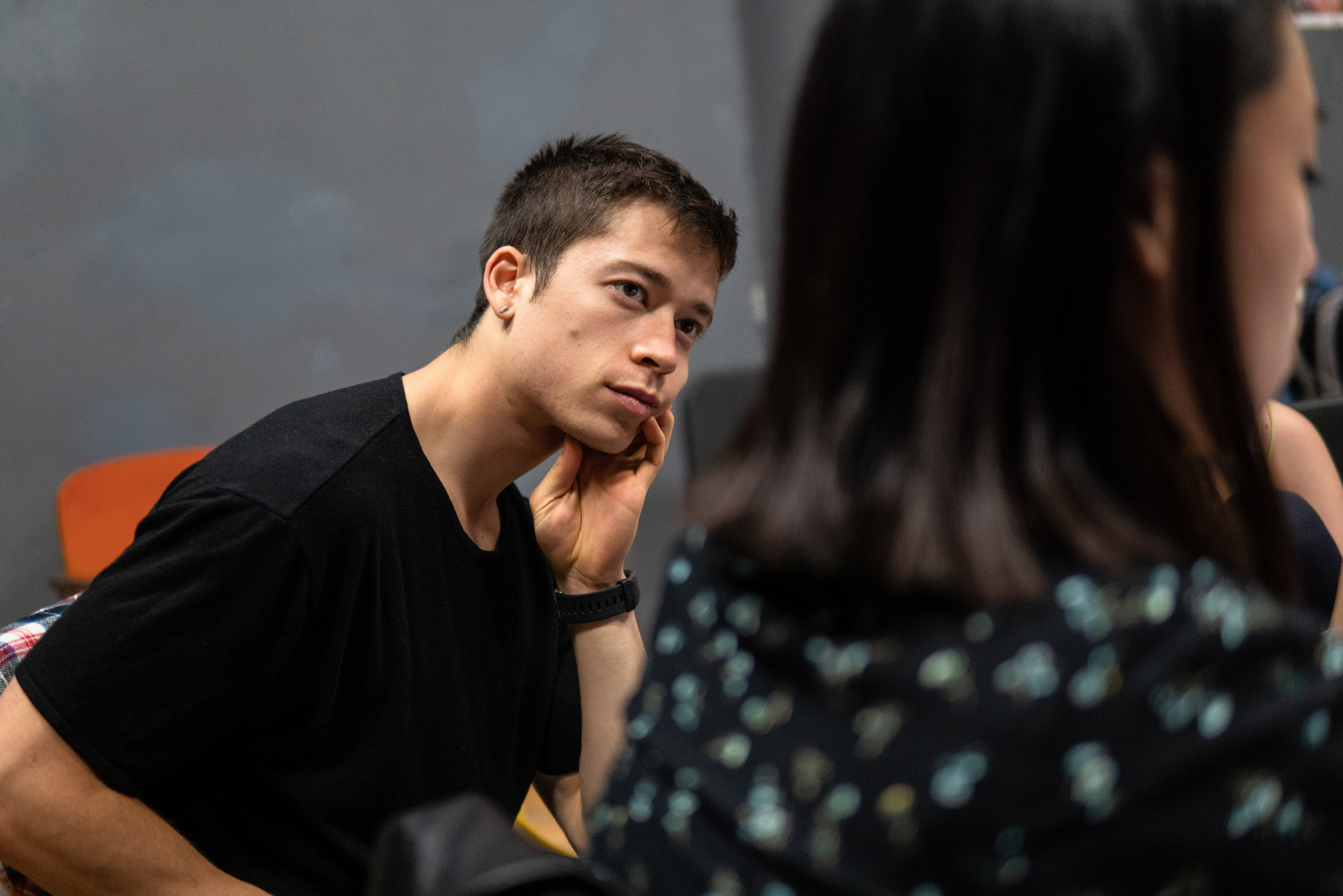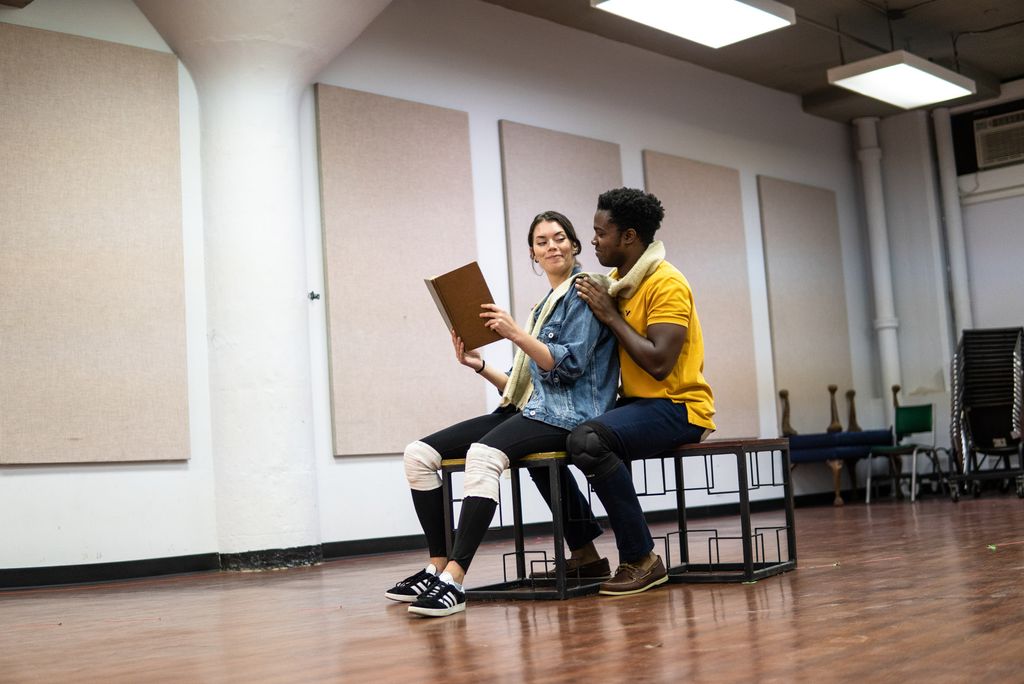CFA Fringe Festival Launches Today

Playwright Quentin Nguyen-Duy (CFA’20) (left) with director Sarah Shin (CFA’19) at a table reading with the CFA Fringe Festival cast of Amputees, his first produced play. Photos by Sophie Park (CAS’20)
CFA Fringe Festival Launches Today
On the bill: a dark comedy by an undergrad and two contemporary operas
First-generation Vietnamese-American Sam Nguyen is home from Fordham University for the holidays, hoping to exploit his father’s history for a school paper: “You throw ethnic shit into an academic setting and you’re guaranteed prize money. It’s racist if you don’t get it,” he says.
It’s a scene from Amputees, a dark comedy by Quentin Nguyen-Duy (CFA’20) about a Vietnamese-American family grappling with cultural identity, the last of three productions in the 23rd annual CFA Fringe Festival. The monthlong festival kicks off today, Friday, October 4, at CFA’s Studio ONE with a contemporary chamber opera, As One, featuring two singers portraying a transgender protagonist, and continues next weekend with another chamber opera, Later the Same Evening, based on five paintings by American artist Edward Hopper.
The funny in Amputees, directed by Sarah Shin (CFA’19), begins with Nguyen-Duy’s description of the setting: “Winter break. An Asian home. All their shoes are off. This Asian home is an apartment in White City, Ohio…. Above the couch hangs an altar. On the altar is a black-and-white photo of a Vietnamese man. He looks disappointed. The floor is slightly bent.”
Ask theater arts major Nguyen-Duy about the autobiographical content of Amputees, his first play, and he smiles shyly. The comic collisions between two brothers, their Vietnamese father, and their depressed American mother bear more than a little resemblance to his own family history, including experiences with mental illness.
“I think a lot of people have family histories that they underestimate the silliness of, the pure hyperbolic insanity that goes on in families,” he says. “When you put it on paper for people who don’t know the family, it becomes incredibly, hilariously absurd.”
Nguyen-Duy grew up in Oregon and Ohio, combating social anxiety with skateboarding and acting in his high school drama club, which led to stints at the BU Summer Theatre Institute and Michigan’s Interlochen Center for the Arts. Amputees began as an exercise for an autobiography class with Kirsten Greenidge, a CFA assistant professor of playwriting and theater arts, who won an Obie Award for her drama Milk Like Sugar (2011). The night before the assignment was due, Nguyen-Duy knocked out a comic scene revolving around two brothers turning lights on and off with a Clapper.
“Miraculously, it worked out,” he says. “The actors had a lot of fun reading it. I wanted to make more fun for the actors and for me, so I could be in it and have fun too, so I expanded that scene for the final production of class.” Greenidge encouraged Nguyen-Duy to expand it for a biweekly writers Monday Meetup series, and Kristin Leahey, a CFA assistant professor of dramatic literature and dramaturgy, had him rework it for a staged reading at the School of Theatre’s New Works festival. They then supported it for Fringe.

“The new work process is interesting, when the work isn’t static yet, hasn’t solidified, and it feels like all the actors and everyone in the room is contributing to those moving parts,” Nguyen-Duy says and laughs. “It feels like a work that could potentially become coherent in the near future—it’s like assembling an airplane midflight.”
As One is a chamber opera for two voices and string quartet, with concept and music by Laura Kaminsky, a libretto by Mark Campbell and Kimberly Reed, and a film by Reed. It’s comprises a 16-song cycle that tells the story of a transgender individual portrayed as a 12-year-old boy and as a grown woman. Jim Petosa, a CFA professor of directing and dramatic criticism, is the stage director, and the music director is William Lumpkin, a CFA associate professor of music, opera, artistic director of the Opera Institute, and director, opera programs.
The piece is sung by two Opera Institute students, baritone Leroy Y. Davis (CFA’20), who plays Hannah Before, and mezzo-soprano Rebecca Printz (CFA’20) as Hannah After. Both are onstage throughout, although not always singing.
Petosa says the format allows you “to dramatize the internal conflict that exists inside a single human being. Imagine if you’re doing Hamlet with two Hamlets, where the inner division actually becomes the presented conflict.” Given the vocal ranges, “there’s something essential about the masculinity of Hannah Before and the femininity of Hannah After, and in the middle of the opera there’s a whole song where the hormone therapy is taken and they go through this kind of loopy ride of that experience.
The relatively minimal staging at Fringe, Petosa says, means the performers must create and maintain the vast majority of the theatrical illusion. It’s “a terrific way of teaching the art of performance to these really exceptional musicians,” he says. “Fringe puts a demand on them that produces a wonderful evolution of their skills—and their confidence.”
The third Fringe production is Later the Same Evening, a chamber opera based on five paintings by noted 20th-century American realist painter Edward Hopper, with music composed by John Musto and a libretto by Mark Campbell. Allison Voth, a CFA associate professor of music, opera, is music director and Matthew Larson, a CFA lecturer in music, opera, is associate music director, with stage direction by Eve Summer. Google the five paintings—Room in New York, Hotel Window, Hotel Room, Two on the Aisle, and Automat—and you’ll get a good idea of the scope of the opera, which explores the lives of the characters in the paintings during a single evening in New York City.
“Our choices for the Fringe operas can be described as a purposeful study in contrasts,” Lumpkin says. “In As One we see a singular character’s story come to life in an emotionally compelling way, while in Later the Same Evening, 11 characters combine to tell their individual and collective stories.
“As always, we strive to select compelling 21st-century operas by living American composers, as well as works that offer numerous and unique performance experiences for the students in the Opera Institute and graduate opera programs at CFA,” he says.
As One: A chamber opera for two voices and string quartet, with music and concept by Laura Kaminsky, libretto by Mark Campbell and Kimberly Reed, film by Kimberly Reed, music direction by William Lumpkin, and stage direction by Jim Petosa. Performances are Friday, October 4, 7:30 pm, Saturday, October 5, 7:30 pm, and Sunday, October 6, 2 pm. Purchase tickets here.
Later the Same Evening: A chamber opera based on five paintings by Edward Hopper, composed by John Musto, with libretto by Mark Campbell, Allison Voth, music director, Matthew Larson, associate music director, and Eve Summer, stage director. Performances are Friday, October 11, 7:30 pm, Saturday, October 12, 2 and 7:30 pm, and Sunday, October 13, 2 pm. Purchase tickets here.
BU New Play Initiative: Amputees: A play by Quentin Nguyen-Duy (CFA’20), directed by Sarah Shin (CFA’19). Performances are Wednesday, October 23, 7:30 pm, Thursday, October 24, 7:30 pm, Friday, October 25, 8 pm, Saturday, October 26, 2 pm, and Sunday, October 27, 7 pm. Purchase tickets here.
All performances are at CFA Studio ONE, 855 Commonwealth Avenue; $10 general admission, free with BU ID, cash only at the door, day of performance, subject to availability.
Comments & Discussion
Boston University moderates comments to facilitate an informed, substantive, civil conversation. Abusive, profane, self-promotional, misleading, incoherent or off-topic comments will be rejected. Moderators are staffed during regular business hours (EST) and can only accept comments written in English. Statistics or facts must include a citation or a link to the citation.